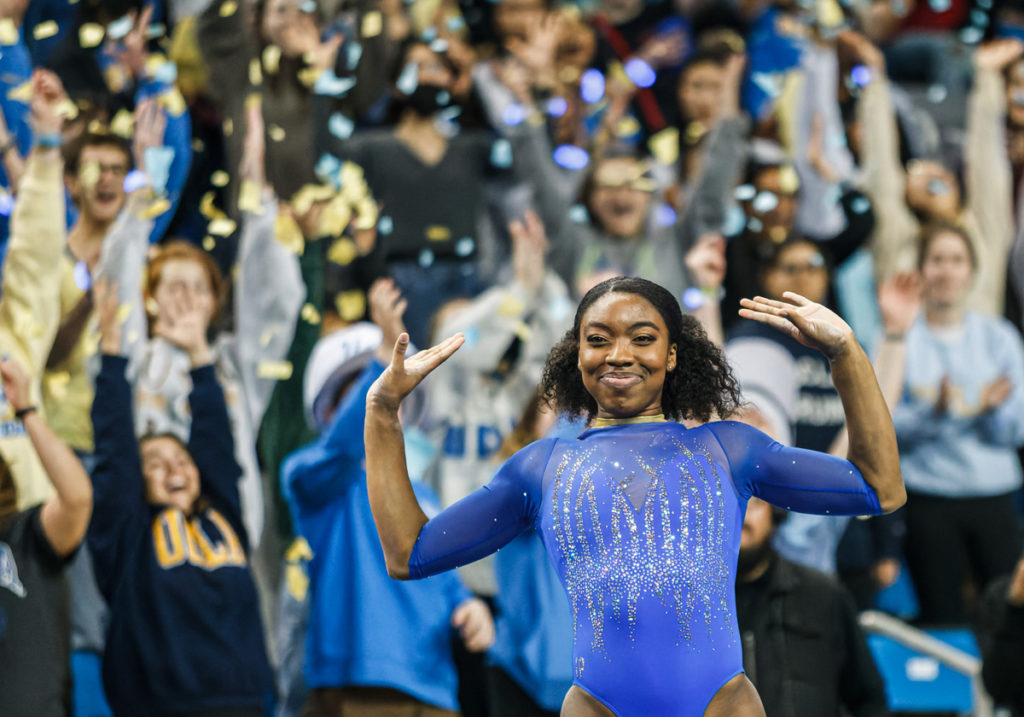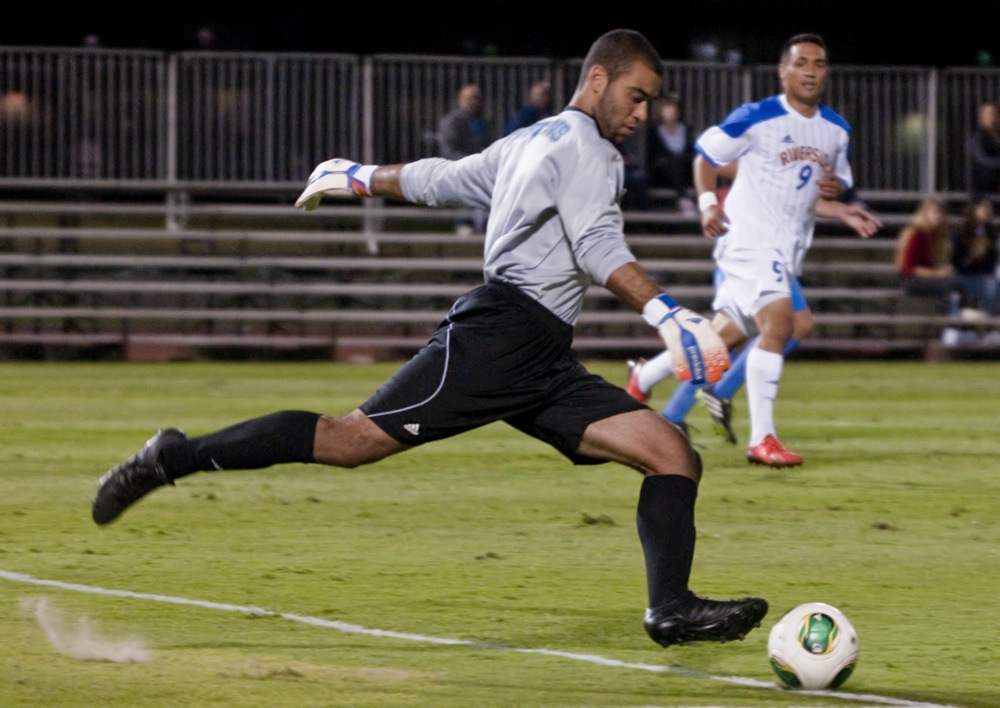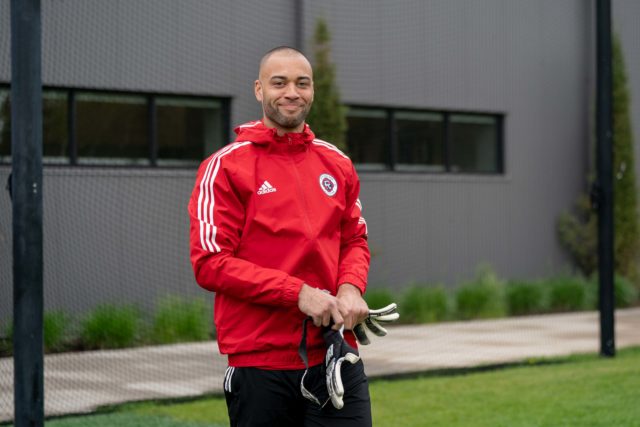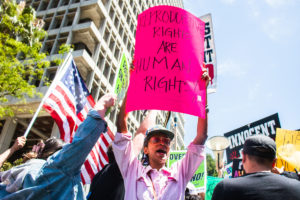This post was update July 9 at 10:27 p.m.
UCLA’s Black student-athletes have a long-standing history of changing the sports world for the better, from Jackie Robinson to Arthur Ashe, to Kenny Washington and Woody Strode, to Jackie Joyner-Kersee and beyond.
“Those Black student-athletes laid the path and the foundation for the student-athletes that are here now,” said Kenny Donaldson, senior associate athletic director for UCLA Athletics.
For Black athletes now, the goal is equal treatment and respect, in part earned by communities of Black players coming together to support each other.
Earl Edwards Jr. – UCLA men’s soccer goalkeeper from 2010 to 2014, including three years as captain, and current member of the New England Revolution – has followed in the footsteps of other Black Bruins. And even younger Bruins have created the Black Student-Athlete Alliance at UCLA, bringing together a community to share their life experiences with.
[Related: Black Student-Athlete Alliance to provide space for player-driven activism]
As the president of Black Players For Change, Edwards is pushing for better treatment of Black players in Major League Soccer, as well as fighting the inequities and injustices Black people face across all levels of the sport.
Following the death of George Floyd in 2020, Edwards and other Black players across the league came together to process their emotions and share their experiences. They eventually founded BPC to help push for improvements in the treatment of Black players.
Now a three-year-old organization, BPC has achieved successes that include installing mini-pitches across the country to increase access to soccer; the addition of an MLS Diversity, Equity and Inclusion officer; and an increased presence of Black players on the MLS Players Association Executive Board. Edwards’ role as president places him at the helm of many of these actions, in addition to his presence on three relevant committees.
During his time at UCLA, Edwards was a history major and said he took African American history courses that influenced his work today. Acknowledging a few of UCLA’s Black alumni, Edwards credited his learning in college for his desire to push for social justice.
“If you look at the history of Arthur Ashe, Jackie Robinson and the trailblazers that they were, it gave me a sense of pride to be at a university that so often was on the right side of history,” Edwards said. “That concept of being on the right side of history was foreign to me and something I learned at UCLA, and it’s a concept that I’ve used a lot here moving forward as I try to push the needle in the right direction.”
Edwards said having a group like BSAA around during his time as a Bruin would have been incredibly beneficial, especially in a sport like soccer that is traditionally less diverse than basketball, track and field or football.
“To be intentional about it, to form an alliance or a group where athletes are crossing sports and creating that sense of community, I imagine would only allow them to have a stronger voice and feel more comfortable on campus and also play their part in continuing to push for more and more equality,” Edwards said.

Rising senior gymnast Chae Campbell was one of the co-presidents of the organization for the 2022-2023 school year. The group, which boasts about 70 members, according to Campbell, took athletes to the Black Student-Athlete Summit in May. Held on USC’s campus, the event had over 1,400 attendees and included talks on a wide range of topics relevant to the Black athlete experience.
Campbell said the best thing about the group has been the sense of community that she has gained.
“Growing up in a predominantly white sport, it was really hard to find people who looked like me to relate to on that level,” Campbell said. “So now that I’m at UCLA, … I’m able to see the difference between what it means to have a community and what it means to not, and when you’re built up by others, you’re able to exceed further. I think the power in that has really opened my eyes to wanting to help others find that community because I want everyone to succeed. And whatever that is, whether that’s athletics, whether that’s something academic, their careers, all I want is for me to be able to say that I left my mark and my impact on people.”
Donaldson is the advisor to the club, in addition to his role as director of Equity, Diversity & Inclusion with the athletics department.
For Donaldson, it’s important that Black student-athletes have a community to share and compare their experiences across sports that their white teammates might not be able to relate to.
“One of our founders for our group was a Black water polo player, and she talked about experiences with her hair that her teammates wouldn’t know about,” Donaldson said. “Or her experiences with other things, like skincare, that her teammates really didn’t have to think about, and then the gymnastics student-athletes could relate to that.”
Donaldson, who met Edwards during his time as an academic advisor from 2010-2013, said he feels a great sense of pride watching UCLA student-athletes go on to excel in all areas of their lives.
“To see Earl being able to excel in the professional sport that he’s in but also creating advocacy, creating change, using his voice and speaking out is what the legacy of UCLA student-athletes, particularly Black student-athletes, is about,” Donaldson said.

BPC supports Black players as they make the jump from the collegiate level to the professional level largely by making sure they see representation, Edwards said.
BPC has members on nearly every team in MLS and a presence at the Rookie Symposium put on by the MLS Player’s Association after the MLS SuperDraft. Edwards said it is important for players of color coming into the league to see representation.
Looking back on his college-age self, Edwards said he wouldn’t be surprised at the work he has been able to do, only that he’s been able to get to this place so quickly.
“If I heard 10 years ago, everything I would be doing, I would be filled with a tremendous sense of pride,” Edwards said. “Given that I do feel that this is a strong calling in my life – being a leader of people and, specifically, creating a better world for Black people – a tremendous sense of fulfillment and pride is definitely how I would feel.”




Comments are closed.